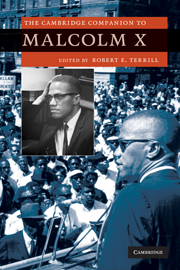Book contents
- Frontmatter
- Introduction
- 1 Malcolm X and Elijah Muhammad
- 2 Autobiography and identity: Malcolm X as author and hero
- 3 Bringing Malcolm X to Hollywood
- 4 Malcolm X and black masculinity in process
- 5 Womanizing Malcolm X
- 6 Malcolm X and the Black Arts Movement
- 7 Malcolm X and African American conservatism
- 8 Malcolm X and youth culture
- 9 Homo rhetoricus Afro-Americanus: Malcolm X and the “rhetorical ideal of life”
- 10 Judgment and critique in the rhetoric of Malcolm X
- 11 Nightmarish landscapes: geography and the dystopian writings of Malcolm X
- 12 Afrocentricity and Malcolm X
- 13 Malcolm X in global perspective
- 14 The legacy of Malcolm X
- Guide to further reading
- Index
11 - Nightmarish landscapes: geography and the dystopian writings of Malcolm X
Published online by Cambridge University Press: 28 May 2010
- Frontmatter
- Introduction
- 1 Malcolm X and Elijah Muhammad
- 2 Autobiography and identity: Malcolm X as author and hero
- 3 Bringing Malcolm X to Hollywood
- 4 Malcolm X and black masculinity in process
- 5 Womanizing Malcolm X
- 6 Malcolm X and the Black Arts Movement
- 7 Malcolm X and African American conservatism
- 8 Malcolm X and youth culture
- 9 Homo rhetoricus Afro-Americanus: Malcolm X and the “rhetorical ideal of life”
- 10 Judgment and critique in the rhetoric of Malcolm X
- 11 Nightmarish landscapes: geography and the dystopian writings of Malcolm X
- 12 Afrocentricity and Malcolm X
- 13 Malcolm X in global perspective
- 14 The legacy of Malcolm X
- Guide to further reading
- Index
Summary
“I have a dream that one day every valley will be exalted, every hill and mountain shall be made low, the rough places will be made plain, and the crooked places will be made straight, and the glory of the Lord shall be revealed . . . So let freedom ring from the prodigious hilltops of New Hampshire . . . from the mighty mountains of New York . . . from the snow-capped Rockies of Colorado . . . From the curvaceous peaks of California . . . let freedom ring from Stone Mountain Georgia . . . from every hill . . . of Mississippi . . . when we let it ring . . . from every state and every city, we will be able to speed up that day when all God's children, black men and white men, Jews and Gentiles, Protestants and Catholics, will be able to join hands and sing . . . thank God almighty, we are free at last.” Speech by Martin Luther King, Jr., delivered on August 28, 1963, on the steps of the Lincoln Memorial in Washington, DC / “I see America through the eyes of the victim. I don't see any American dream; I see an American nightmare.” So argued Malcolm X in his “Ballot or the Bullet” speech delivered at the Cory Methodist Church in Cleveland, Ohio, just months after King's “I Have a Dream” Speech. Malcolm X explained that he was not an American. Rather, he considered himself to be “one of the 22 million black people who are victims of Americanism. One of the 22 million black people who are victims of democracy, nothing but disguised hypocrisy.” Consequently, Malcolm X spoke “not as an American, or a patriot, or a flagsaluter, or a flag-waver” but instead “as a victim of [the] American system.” Malcolm X viewed the American landscape as a nightmare. He did not see a Promised Land; America - at least for African Americans - was not a bright “City on a Hill” illuminating the world in all its glory.
- Type
- Chapter
- Information
- The Cambridge Companion to Malcolm X , pp. 137 - 149Publisher: Cambridge University PressPrint publication year: 2010



